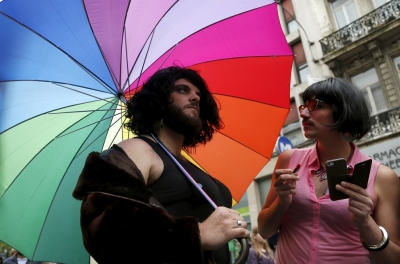Analysis: What Liberals Think About Transgenderism
The Traditionalist View
The traditionalist understanding of sex and gender, which can also be described as the conservative or biological view, is quite different. Sex and gender are the same. Gender is determined by one's chromosomes and can never change.

The traditionalists also believe that the scientific research is on their side. Transgenderism is a symptom of larger psychological problems that should be addressed. When those problems are dealt with, the symptoms go away.
Dr. Paul McHugh led the psychiatry department at Johns Hopkins Hospital for many years and is currently its Distinguished Service Professor of Psychiatry. In 2004, he wrote an article for First Things explaining why Johns Hopkins stopped doing sex reassignment surgeries.
After conducting extensive research, his department found that transgender individuals suffer from various mental illnesses, and surgeries that helped them become more like the opposite sex did not cure those illnesses and often made things worse.
"I have witnessed a great deal of damage from sex-reassignment," he wrote. "The children transformed from their male constitution into female roles suffered prolonged distress and misery as they sensed their natural attitudes. Their parents usually lived with guilt over their decisions — second-guessing themselves and somewhat ashamed of the fabrication, both surgical and social, they had imposed on their sons.
"As for the adults who came to us claiming to have discovered their 'true' sexual identity and to have heard about sex-change operations, we psychiatrists have been distracted from studying the causes and natures of their mental misdirections by preparing them for surgery and for a life in the other sex. We have wasted scientific and technical resources and damaged our professional credibility by collaborating with madness rather than trying to study, cure, and ultimately prevent it."
Among the traditionalists, there are some who mock, tease and belittle transgender individuals. Others, however, usually religious conservatives, believe the proper response should be motivated by love.
All people, including transgender people, are created by God, in the image of God, and as such deserve dignity and respect. Loving them also means wanting what is best for them, which does not include enabling their suffering by denying their true gender, but does include wanting to help them with the conditions that cause them to want to be a gender different than the one God gave them. (This view also matches the editorial opinion of The Christian Post and can be found in many op-ed's we have published. See, for instance, here, here and here.)
Why does it matter?
Both sides believe the other side is doing harm to transgender individuals.

In a June 3 op-ed, Damon Linker, a liberal columnist for The Week, argued that the "the gap between" the liberal and traditionalist views "becomes a chasm" when "the [liberal view] judges the very act of making a moral judgment in terms of [the traditionalist view] to be harmful — and therefore an act of cruelty, injustice, and even evil."
While, as acknowledged above, some traditionalists are unkind to transgender people, the liberal view is that all traditionalists are unkind in the simple act of not agreeing with the liberal view. In other words, the liberal view is that the only way for a traditionalist to be kind to a transgender person is to cease being a traditionalist.
Traditionalists believe liberals are doing harm to transgender people because they are misdiagnosing the problem. Transgender people are not getting the help they need for the underlying psychological problems that are causing them to want to be a different sex, and in some cases undergoing surgeries that mutilate their bodies.
What is being done to children in some of these cases is particularly egregious. According to McHugh, 70 to 80 percent of children who like to pretend they are a different gender grow out of that phase by the time they are adults. Yet, some parents are giving their children hormone treatments that can stunt their growth and cause infertility.
There are also a large number of public policy implications, such as:
Which view, or views, will be taught in public schools?
In those schools, what provisions will be made for transgender students? Which bathrooms will they use? For which gender-specific sports team can they play?
In colleges and universities, in which dormitories can transgender students reside?
What about religious colleges that hold the traditionalist view — must they abide by the liberal view to maintain their tax-exempt status, for their students to receive government aid, or to keep their accreditation?
What about traditionalist religious institutions that receive government grants to provide social services — will they be required to align their hiring policies with the liberal view?
While transgender people represent a small portion of the population (0.3 percent, by one estimate), all will be dealing with the implications of the clash of transgenderism worldviews.




























